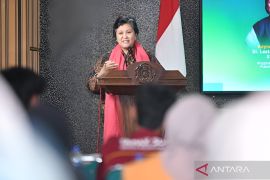"Efforts for early health detection of (pregnant) mothers and children at health facilities at the smallest level like integrated health posts (posyandu) in neighborhoods and community health centers (puskesmas) must be carried out proactively to prevent the birth of babies at risk of stunting,” she said in a statement released here on Friday.
Efforts to curb stunting cases by improving the nutritional intake of pregnant women, children, and under-five children must be carried out consistently, she added.
According to her, efforts to monitor the fulfillment of the nutritional needs of pregnant women, children, and under-five children are essential.
She noted that, through routine health screenings, several potential diseases that can disrupt the growth and development of children can be expected to be detected early.
Early detection efforts can be carried out through a national movement so that significant measures can be taken to curb stunting, she added.
She said the national movement will need support from stakeholders in the central and regional governments to improve the awareness of the community in implementing a healthy lifestyle.
Based on the records of the National Population and Family Planning Agency (BKKBN), 1.9 million to 2 million couples get married per year, and as many as 1.6 million women who get pregnant in the first year of marriage give birth to 300 thousand babies that are at risk of stunting.
The agency’s record also shows that the maternal mortality rate in Indonesia still stands at 189 per 100,000 live births.
Moerdijat said that those findings are concerning as Indonesia is currently striving to curb stunting in the country.
Based on the Indonesian Nutritional Status Survey (SSGI), the nation’s stunting prevalence stood at 21.6 percent in 2022.
Related news: Varsities urged to participate actively in addressing stunting issues
Related news: Local food helps prevent stunting during dry season crisis: BKKBN
Translator: Boyke Ledy, Raka Adji
Editor: Anton Santoso
Copyright © ANTARA 2023











